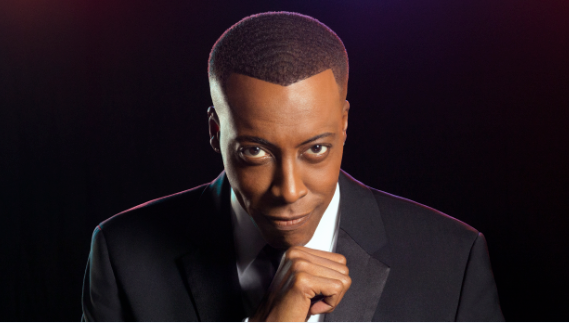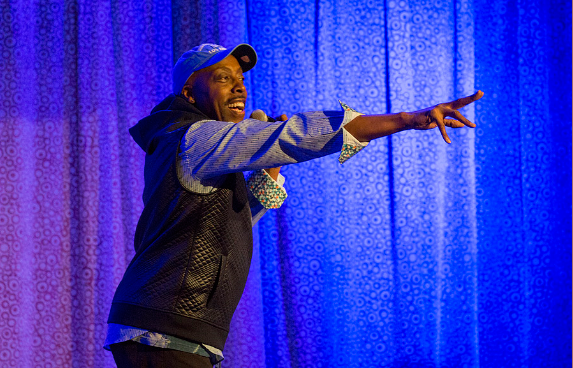
By Je’Don Holloway Talley
For the Birmingham Times
Legendary late-night TV host, actor, and comedian Arsenio Hall brings his self-described “The Geritol Tour” road show to Birmingham this weekend. How did he come up with the name?
“Because I go out when I want,” Hall said with a laugh. “First of all, I like to go out and keep it fun because I’m not doing it for money; it’s not for the same reasons I used to do it.”
“Life is good. My son is in college. I do this because it truly is cathartic for me. It’s a love that I’d lost and have back now, and I do this totally for me. I would go as far as to say I need it.”
Hall—returning to stand-up comedy after a 20-year hiatus—will perform at the StarDome this weekend, Friday, September 28, and Saturday, September 29.
“I love it. I get to tell entire audiences what I think about [President] Donald Trump, child rearing, love life, all those wonderful things,” he said. “First of all, black people are afraid of therapy, but we need somebody to talk to. Instead of laying on a couch and talking to a doctor, I talk to an audience.”
Asked if he touches on any sensitive, political, or politically correct issues during his performances, Hall said some of that is part of who he is.
“To be honest with you, I grew up in a really tough neighborhood in Cleveland, [Ohio], around a lot of pimps and numbers runners. … I remember Don King, when I was a kid, before he was a boxing promoter. He ran the numbers on the streets of Cleveland with my Uncle Oliver, my mother’s brother,” he said. “When you look at something like that, you say, ‘Wow, that formulated who I am.’”
Also, a comedian has to stay on top of the news to make sure the material is current and relevant, Hall said.
“You can’t be lazy and be humorous these days. Your messages today may be different than your message next week,” he said. “In this era, every day I have to read the paper and turn on the TV because you don’t know, … [former Trump campaign chairman] Paul Manafort could be in jail and O.J. [Simpson] could be [in the news]. Then the whole joke changes: … [reality TV star and former Trump political aide] Omarosa got 200 tapes, she might release 30 of them, and then I’ll have some [more] new jokes.”
“The Truth”
Some may be surprised to hear that Hall, a comedy veteran, was initially intimidated by going back on the road.
“I started to get afraid of it,” he said. “I had left stand-up for a long time. If you leave something, sometimes you find yourself in a position of forgetting how well you do it, how much you need it, and things of that nature. It was like, ‘Oh my gosh, I don’t know, … can I still go up and talk for an hour to an audience?’ Once I started doing it [again], I realized, … you know, there’s just something cathartic about stand-up.”
There are differences between stand-up and television, Hall said: “When you’re doing TV, you make a lot of money and it’s very, very rewarding, but you don’t get to always be yourself. There’s a truth about stand-up that exists, that doesn’t exist in television.”
Stand-up comedy gives Hall the freedom to be himself.
“If you see me on the ‘The Apprentice,’ you’re not gonna hear what I think about Donald Trump. But if you come see me doing stand-up, you’ll get to hear what it was really about.”
Hall, 62, is a Cleveland, Ohio native, who moved to Chicago in 1979 to pursue a career in comedy. He credits jazz musician Nancy Wilson with his beginnings; she took him on tour with her. In the late 1970s, Hall played Alabama—his only time performing in the state—where he learned a valuable lesson about “knowing your room.”
Alabama Visit

“It was a corporate gig in Alabama, and, you know, those are private events,” Hall said. “So, this one was for a Republican [party] dinner, and [back then] I didn’t know what a corporate gig was. … I’m a young comic, and this was one of my first times ever being on the road.”
His first joke was about Sears, and it landed poorly: “Hey, you all have a Sears, and they had a ‘white sale.’… I bought a Caucasian family, and I’m gonna take them back with me!”
“That was the wrong room to tell that joke in,” Hall said. “I learned a lesson very quick, and I spent 20 minutes looking at an audience that was mad at me. I haven’t been back to Alabama since.
“You know, obviously, I stopped doing stand-up for a long time. But, fortunately, I will be able to go to my mother’s birthplace.”
Hall’s mother, Anne Hall, was born in Alexander City, and he plans to visit while he’s in Birmingham.
“My mother is more excited about this gig than any gig,” he said. “I had forgotten that my mother was born in Coosa County. She’s from Alexander City, and she started telling me all these stories. … I didn’t realize that Alexander City only has about 12 people in it. … She said that in her area, she remembers there was [former NFL wide receiver and hall of famer] Terrell Owens’ family and her family—and, pretty much, that’s the whole town.”
Opening Act
Hall was an opening act for Wilson, as well as several other legends, including singers Patti LaBelle, Tina Turner, Stevie Wonder, and the late Aretha Franklin.
“I always like to tell people the story of going on the road with Aretha Franklin,” Hall said. “It was so early in my career that when [people] saw my name on the marquee underneath Aretha Franklin, they thought Arsenio Hall was the venue!”
Speaking of Franklin, Hall said the two of them had something in common: a fear of flying.
“That’s how I hooked up with [Franklin], because [she] didn’t like to fly. [Franklin] and I could [have done] ‘The Geritol Tour’ together,” he laughed.
“I loved working with her. She was so sweet. She was so versatile and gifted. People don’t even know how gifted she was. She would walk into the lobby of a hotel, see a piano, sit down at it, and you would forget, ‘Oh, yeah, [Aretha Franklin] plays the piano, too.’ She was the consummate musician. That’s something you just don’t have anymore.”
Late Night
Hall’s early tours put him on the radar of late-night producers at the Fox Television Network. In the fall of 1987, the late Joan Rivers walked away from “The Late Show Starring Joan Rivers” after a dip in ratings. Hall was chosen to be the interim host and went on to craft a show that was absent in late-night television. In 1989, he ultimately landed his own deal with Paramount Television for “The Arsenio Hall Show.”
Winning over Joan Rivers’ audience was no easy feat: “It was very hard,” Hall said. “In Hollywood, it’s very cliquish. [Rivers] had a lot of people who would do her show because she had previously been a disciple of [late-night TV pioneer] Johnny Carson and she was a legend. … I was the opposite of legend.
“What I had to do at that point was create my own following and my own audience. What I didn’t realize at that time was that was a blessing. … America really didn’t have a late-night show with my sensibilities. I made that show what I always wanted to see in television.”
Hall’s rise came before social media, at a time when information was passed around via word of mouth.
“When I was growing up, you could turn on the TV, turn on Carson, [best known as the host of ‘The Tonight Show Starring Johnny Carson’], and you might not see a black person all month,” he said. “You didn’t have Twitter. I remember a time when you had to tell people [about things]. … Say, for instance, you’re at church on Sunday, you might say, ‘Al Green is gonna be on ‘The Tonight Show’ on Wednesday.’ That was like making plans because that was such an unusual situation. … You didn’t always see people of color on that show.”
Hall felt it was his job to create a more inclusive show.
“It was actually really easy for me to say, ‘I’m gonna do the show I want to see. I’m gonna create the show that didn’t exist.’ I started calling people Carson and Rivers probably would never call,” he said.
Huge Impact
Hall reached out to a community he was familiar with.
“The first rapper I ever called—it was so far back that we called him Todd—was LL Cool J, [James Todd Smith]. I called [entrepreneur and hip-hop producer] Russell Simmons and all the people at [legendary hip-hop label] Def Jam, and I’m like, ‘I need guests.’ I put [rap group] Whodini on, performing ‘Freaks Come Out at Night.’ I got [former heavyweight boxing champion] Mike Tyson on [the show]. … And all of a sudden, I had my own audience starting to watch because they were seeing a show they’d never seen before.”
Times have changed, and Hall now uses social media to his advantage.
“I use Twitter to tell people where I’ll be,” he said. “There was never a way for an entertainer to watch the watchers. … While I’m on the plane, … instead of just looking at what a [journalist] might say, I’m looking at all the tweets and Instagram posts of people who were at the show last night. It’s so incredible that comics and entertainers of this era have things we didn’t have.”
Social media comes in handy in other areas, too, Hall said.
“Even writing, when I’m writing a joke, whether it’s a joke about Paul Manafort or a joke about [R&B singer] Chris Brown, I can Google that name and get pertinent information,” he said. “Back in the day, the information was wrong, or you were trying to find a People magazine with an old article about them to find out, ‘How old is that person? How many kids does that person have?’ when you wanted to write a joke.
“Now you can find out in 10 seconds that [renowned actor and comedian] Eddie Murphy has 10 kids. Which, congratulations to [Murphy], he just told me he [is expecting] his 10th child,” due in December to Murphy’s longtime girlfriend Paige Butcher.
“Coming to America”
Speaking of Murphy, Hall talked about the sequel to “Coming to America,” which starred him and Murphy in the late 1980s.
“‘Coming to America’ is a family classic, sort of a black fairy tale,” he said. “The [sequel] is being penned by Kenya Barris, [who created the TV show ‘black-ish’ for ABC and wrote the movie ‘Girls Trip,’ which starred comedian Tiffany Haddish and rapper and actor Queen Latifah]. They allowed [Murphy, who is consulting on the film], to meet with writers who are successful right now. I’ve seen a couple of [the] drafts, and he’s got a funny, unique way of getting us back to America.”



